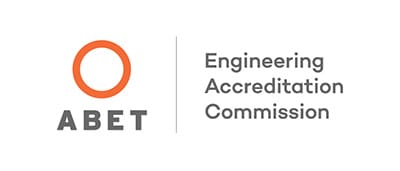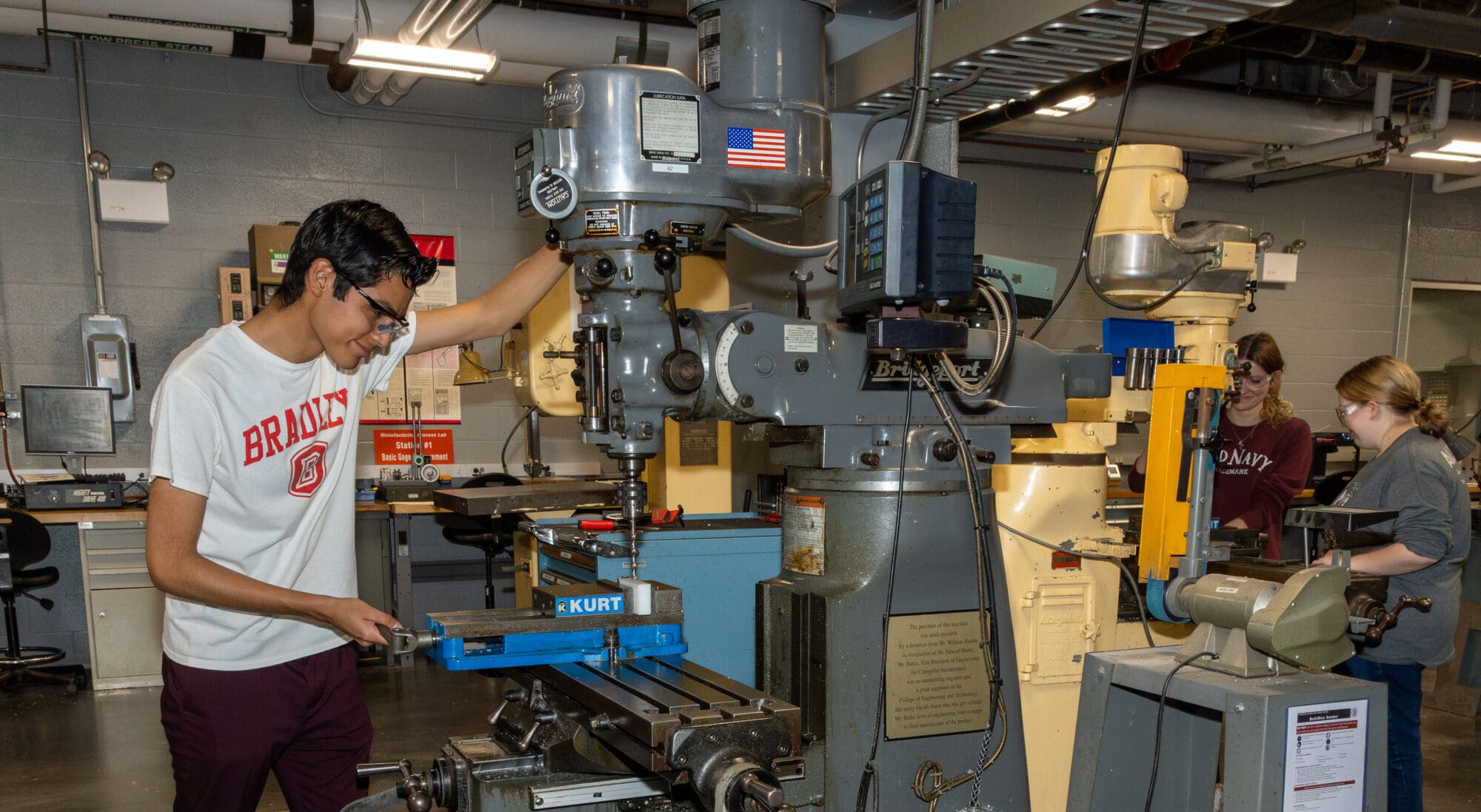Home / Academics / Programs / Major / Manufacturing Engineering
Manufacturing Engineering
Turn your problem-solving skills into a high-demand career with a degree in Manufacturing Engineering. You’ll learn how to design and improve everything from materials and tools to full production and supply chain systems. It’s the only engineering field that covers the entire process of making products. At Bradley, you’ll build the in-demand technical skills to help industries work smarter, faster, and better.
Experiential Learning
State-of-the-Art Technology
- Work with advanced hardware such as CNC machining centers, injection molding machines, coordinate measuring machines, and tensile testers
- Gain expertise in industry-standard software, including AutoCAD, Creo, Mastercam, MATLAB, and Python
Industry-Sponsored Real-World Projects
- Analyze production systems and propose efficiency improvements for companies like American Print On Demand and Matcor Industries
- Senior Capstone Project – Tackle real engineering challenges with sponsors like Caterpillar, CNH, and Collins Aerospace
Industry Connections & Networking
- Join professional organizations such as the Society of Manufacturing Engineers (SME), the American Society for Quality (ASQ), and the American Society for Metals (ASM International)
- Network with alumni from companies like Caterpillar, Komatsu, and Dynamic Manufacturing
- Access job shadowing, plant tours, summer internships, and full-time employment opportunities
Program Details

Accredited by the Engineering Accreditation Commission of ABET, under the commission’s General Criteria and Program Criteria for Manufacturing Engineering.
Program Educational Objectives
Within five years into their careers, the graduates from the Manufacturing Engineering Program at Bradley University will have successful careers based on
- Demonstrated ability to recognize manufacturing business problems and implement effective solutions.
- Demonstrated ability to effectively lead cross-functional teams in the design, implementation and improvement of processes and systems.
- Demonstrated professional development through continuous learning opportunities such as varied work assignments, graduate education, or professional associations.
- Demonstrated involvement in service activities that benefit the profession or the community.
Student Outcomes
In order to meet the program educational objectives, students graduating from Bradley’s manufacturing engineering program will attain the following outcomes.
- An ability to identify, formulate, and solve complex manufacturing engineering problems by applying principles of engineering, science, and mathematics.
- An ability to apply engineering design to produce solutions that meet specified needs with consideration of public health, safety, and welfare, as well as global, cultural, social, environmental, and economic factors.
- An ability to communicate technical concepts effectively with a range of audiences.
- An ability to recognize ethical and professional responsibilities in engineering situations and make informed judgments, which must consider the impact of engineering solutions in global, economic, environmental, and societal contexts.
- An ability to function effectively on multi-disciplinary teams whose members together provide leadership, create a collaborative and inclusive environment, establish goals, plan tasks, and meet objectives.
- An ability to develop and conduct experiments, analyze, and interpret data related to manufacturing processes, materials evaluation, and manufacturing systems, and use engineering judgment to draw conclusions.
- An ability to acquire and apply new knowledge as needed, using appropriate learning strategies.
Degree Concentrations
Shape your future your way. Explore our degree concentrations to personalize your education and focus on what inspires you.
The Lean Manufacturing concentration prepares you to lead the charge in continuous improvement. You’ll develop the skills to design and optimize manufacturing, production, and supply chain systems while eliminating waste, improving quality, and reducing costs.
In this concentration, you’ll also learn how to lead lean and Six Sigma teams, drive process improvements, and create real business impact—helping companies grow their market share and profitability.
The Process Engineering concentration gives you the tools to design efficient manufacturing systems and create high-quality products. You’ll build expertise in product design, materials selection, manufacturing processes, automation, and advanced manufacturing systems. Graduates with this concentration are in demand across industries like automotive, aerospace, and heavy equipment manufacturing—where they help companies innovate, streamline production, and deliver exceptional products.
Career Opportunities
As a manufacturing engineering graduate, you’ll step into a world of exciting, high-impact careers. Our graduates launch successful futures with leading companies like Caterpillar, Tesla, John Deere, and Boeing, where they work as manufacturing engineers, process engineers, quality engineers, lean engineers, and supply chain analysts.
You’ll find opportunities across industries such as automotive, aerospace, healthcare, consumer goods, electronics, and energy—and many graduates push the boundaries of innovation in areas like robotics, smart factories, AI-driven manufacturing, and sustainable design. With a degree in manufacturing engineering, you won’t just join the workforce—you’ll shape the future of it.
Minor
In today’s competitive industries, quality isn’t optional—it’s essential. Bradley’s Quality Engineering (QE) minor gives you the skills to improve products, streamline processes, and boost efficiency across a wide range of fields. Open to all students, this minor builds your expertise in analyzing, improving, and managing quality throughout every stage of production—from research and development to manufacturing, sourcing, distribution, and customer service.

